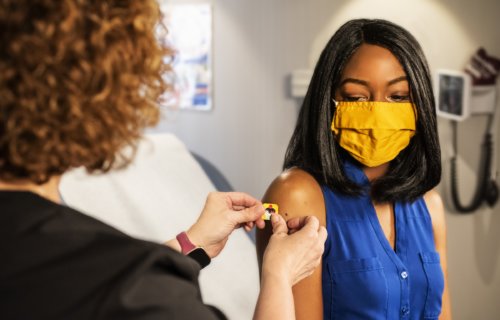NEW YORK — COVID-19 vaccines are proving to be very safe for both pregnant women and their unborn children. Now, New York University researchers report pregnant women who receive an mRNA COVID-19 vaccine (Moderna or Pfizer) actually pass on high levels of protective antibodies to their newborns.
The team examined 36 newborns during this study. All of the children’s mothers received the COVID vaccine while pregnant. Incredibly, every single baby displayed protective antibodies at birth.
Study authors explain that mRNA vaccines are so effective, in general, because they trigger the creation of the “right” antibodies and blood proteins capable of providing robust COVID-19 protection. Of course, until now, it had been unclear whether mothers pass on their coronavirus protection to their children.
Besides vaccination, people are capable of gaining antibodies the old fashioned way — through infection and recovery. However, scientists can differentiate antibodies produced by vaccines from those you create after being sick. This allows researchers to confirm whether or not the antibodies they find in newborns come directly from vaccinations.
Despite studies showing the COVID-19 vaccines are safe for pregnant women, estimates reveal that only 23 percent of currently pregnant women are vaccinated. Study authors hope their findings help encourage more women to get their shots. According to this work, it will not only protect them but their children as well.
How long will this protection last?
Notably, the study discovered the highest levels of antibodies in the cord blood of vaccinated women during the second half of their pregnancies.
“Studies continue to reinforce the importance of vaccines during pregnancy and their power to protect two lives at once by preventing severe illness in both mothers and babies,” says co-principal investigator Ashley S. Roman, MD, director of NYU Langone Health’s Division of Maternal–Fetal Medicine and the Silverman Professor of Obstetrics and Gynecology, in a university release. “If babies could be born with antibodies, it could protect them in the first several months of their lives, when they are most vulnerable.”
Study authors stress that their work confirms what both the CDC and FDA have been saying for months. The research found absolutely no evidence to suggest that vaccination while pregnant increases the risk of birth complications or any other risks to the fetus.
Senior study author Jennifer L. Lighter, MD, an associate professor in the Department of Pediatrics, concedes that the patient sample in this study is small. Despite this drawback, Lighter adds, “it is encouraging that neonatal antibody levels are high if women are vaccinated.”
“High levels of transplacental antibody transfer are not surprising. It is consistent with what we see with other immunizations. Our findings add to a growing list of important reasons why women should be advised to receive the COVID-19 vaccine during pregnancy for the added benefit of their newborn receiving crucial protection,” the hospital epidemiologist at Hassenfeld Children’s Hospital at NYU Langone concludes.
Researchers note further studies will help determine just how protective and long-lasting infant antibodies coming from maternal vaccination are. They are also hoping to reproduce these findings in a much larger population sample.
The study appears in American Journal of Obstetrics & Gynecology MFM.
